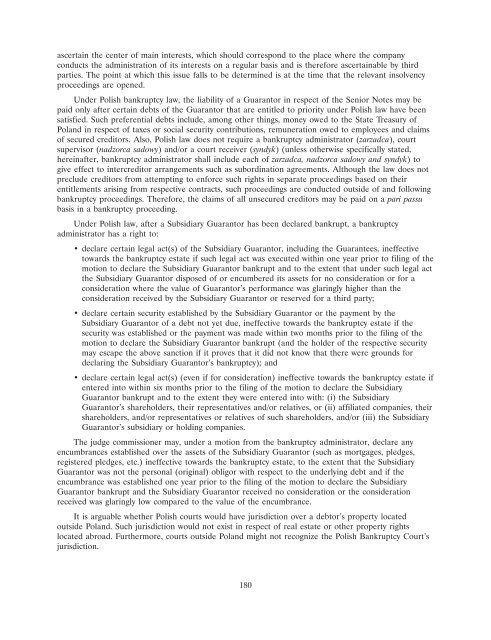Ardagh Glass Finance plc - Irish Stock Exchange
Ardagh Glass Finance plc - Irish Stock Exchange
Ardagh Glass Finance plc - Irish Stock Exchange
Create successful ePaper yourself
Turn your PDF publications into a flip-book with our unique Google optimized e-Paper software.
ascertain the center of main interests, which should correspond to the place where the company<br />
conducts the administration of its interests on a regular basis and is therefore ascertainable by third<br />
parties. The point at which this issue falls to be determined is at the time that the relevant insolvency<br />
proceedings are opened.<br />
Under Polish bankruptcy law, the liability of a Guarantor in respect of the Senior Notes may be<br />
paid only after certain debts of the Guarantor that are entitled to priority under Polish law have been<br />
satisfied. Such preferential debts include, among other things, money owed to the State Treasury of<br />
Poland in respect of taxes or social security contributions, remuneration owed to employees and claims<br />
of secured creditors. Also, Polish law does not require a bankruptcy administrator (zarzadca), court<br />
supervisor (nadzorca sadowy) and/or a court receiver (syndyk) (unless otherwise specifically stated,<br />
hereinafter, bankruptcy administrator shall include each of zarzadca, nadzorca sadowy and syndyk) to<br />
give effect to intercreditor arrangements such as subordination agreements. Although the law does not<br />
preclude creditors from attempting to enforce such rights in separate proceedings based on their<br />
entitlements arising from respective contracts, such proceedings are conducted outside of and following<br />
bankruptcy proceedings. Therefore, the claims of all unsecured creditors may be paid on a pari passu<br />
basis in a bankruptcy proceeding.<br />
Under Polish law, after a Subsidiary Guarantor has been declared bankrupt, a bankruptcy<br />
administrator has a right to:<br />
• declare certain legal act(s) of the Subsidiary Guarantor, including the Guarantees, ineffective<br />
towards the bankruptcy estate if such legal act was executed within one year prior to filing of the<br />
motion to declare the Subsidiary Guarantor bankrupt and to the extent that under such legal act<br />
the Subsidiary Guarantor disposed of or encumbered its assets for no consideration or for a<br />
consideration where the value of Guarantor’s performance was glaringly higher than the<br />
consideration received by the Subsidiary Guarantor or reserved for a third party;<br />
• declare certain security established by the Subsidiary Guarantor or the payment by the<br />
Subsidiary Guarantor of a debt not yet due, ineffective towards the bankruptcy estate if the<br />
security was established or the payment was made within two months prior to the filing of the<br />
motion to declare the Subsidiary Guarantor bankrupt (and the holder of the respective security<br />
may escape the above sanction if it proves that it did not know that there were grounds for<br />
declaring the Subsidiary Guarantor’s bankruptcy); and<br />
• declare certain legal act(s) (even if for consideration) ineffective towards the bankruptcy estate if<br />
entered into within six months prior to the filing of the motion to declare the Subsidiary<br />
Guarantor bankrupt and to the extent they were entered into with: (i) the Subsidiary<br />
Guarantor’s shareholders, their representatives and/or relatives, or (ii) affiliated companies, their<br />
shareholders, and/or representatives or relatives of such shareholders, and/or (iii) the Subsidiary<br />
Guarantor’s subsidiary or holding companies.<br />
The judge commissioner may, under a motion from the bankruptcy administrator, declare any<br />
encumbrances established over the assets of the Subsidiary Guarantor (such as mortgages, pledges,<br />
registered pledges, etc.) ineffective towards the bankruptcy estate, to the extent that the Subsidiary<br />
Guarantor was not the personal (original) obligor with respect to the underlying debt and if the<br />
encumbrance was established one year prior to the filing of the motion to declare the Subsidiary<br />
Guarantor bankrupt and the Subsidiary Guarantor received no consideration or the consideration<br />
received was glaringly low compared to the value of the encumbrance.<br />
It is arguable whether Polish courts would have jurisdiction over a debtor’s property located<br />
outside Poland. Such jurisdiction would not exist in respect of real estate or other property rights<br />
located abroad. Furthermore, courts outside Poland might not recognize the Polish Bankruptcy Court’s<br />
jurisdiction.<br />
180
















